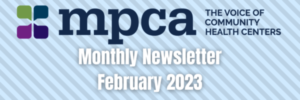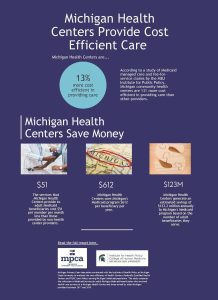Dental therapists broaden access to care l by Misty Davis
If you’ve ever had a toothache, you know how hard it can be to eat, sleep, work or go to school until you’ve received dental care.
For many Michiganians, dental care is inaccessible, as 1.5 million residents live in areas with a shortage of dentists. Even in areas that have enough dentists, patients may struggle to find one who accepts their insurance.
Due to intense competition for dental staff, which has been magnified by the exodus of providers that persists in the wake of the COVID-19 pandemic, our dental clinics are overwhelmed and understaffed. Many clinics report months-long wait lists for appointments and have patients driving hours to access oral health care.
Now the good news: Michigan has authorized a new type of dental provider, the dental therapist.
While this profession may be unfamiliar to many, it has the potential to play a significant role in reducing barriers to oral health care for those who need it the most.
Dental therapists are licensed oral health professionals who work under the supervision of dentists to provide commonly needed care like exams, cleanings, sealants and fillings. They can work remotely, bringing care directly to people where they are, whether that’s in schools, hospitals, nursing homes or rural communities.
The next step to getting dental therapists into Michigan’s community health centers and dental offices is to implement education programs. Several colleges and universities in our state are excited about developing education programs. But with their limited budgets already stretched by inflation, they could use some support with start-up costs.
Costs involved with launching a dental therapy program may include structural changes to on- campus clinics, establishing partnerships with community health centers and expanding their capacity to precept students, costs associated with accreditation, and supporting the establishment of program coordinators, directors and educators.
Meanwhile, a new federal report has concluded that dental therapy provides “clear benefits” to communities, and is calling on Congress and the Biden administration to implement policies that will help grow dental therapy in Michigan and nationwide.
The report found that adding dental therapists to dental teams resulted in more people getting care and reduced wait and travel times for appointments, and resulted in a workforce more representative of the community it serves. It recommends the federal government support education programs for dental therapists both by dedicating funding specifically to them and by making dental therapy education programs eligible for existing oral health workforce programs. The report also encourages federal policymakers to support dental therapists through scholarships and loan repayment programs.
By implementing these recommendations, federal policymakers could help states like Michigan grow their oral health workforces, creating both better access to care for patients and well-paying jobs for new providers within underserved communities.
Another opportunity in front of Congress to support Michigan’s oral health workforce pipeline are the spending bills before the House and Senate that would remove the long-standing prohibition on a dental workforce program that was written into the Affordable Care Act.
This program would award 15 grants of at least $4 million to support the development of new provider types such as dental therapists. Since the program was passed, special interest groups have lobbied to block the funding, effectively preventing it from reaching colleges and universities.
Michigan is one of 11 states with dental therapy legislation but no dental therapy education programs. Removing this funding block would allow federal dollars to flow into colleges and universities interested in developing dental therapy programs in Michigan and beyond, and full implementation of the profession could finally be realized in dental therapy states.
–Misty Davis, a registered dental hygienist, is the oral health program manager at the Michigan Primary Care Association (MPCA).


 The report demonstrates that Michigan’s health centers save the state of Michigan $51 per member per month (up from $12 in 2014), or $612 per beneficiary per year (up from $144 in 2014) in Medicaid expenditures. Based on the number of adult Medicaid patients Michigan FQHCs serve, health centers generate an estimated savings of $123.2 million per year to the Michigan Medicaid program.
The report demonstrates that Michigan’s health centers save the state of Michigan $51 per member per month (up from $12 in 2014), or $612 per beneficiary per year (up from $144 in 2014) in Medicaid expenditures. Based on the number of adult Medicaid patients Michigan FQHCs serve, health centers generate an estimated savings of $123.2 million per year to the Michigan Medicaid program.
 coordinates the systems administrators that oversee data center operations for our hosted health centers, manage cloud migrations, and facilitate security analysis and hardening operations. Dave is excited about the evolution from VirtualCHC to VirtuALLY and all the new IT services we can offer at non-profit adjusted prices. A fun fact about Dave is that he was born in England and moved to the U.S. when he was 12. Dave layers an American accent over his English one, but there are some words he just can’t seem to Americanize. To relax, he plays golf–but It never works.
coordinates the systems administrators that oversee data center operations for our hosted health centers, manage cloud migrations, and facilitate security analysis and hardening operations. Dave is excited about the evolution from VirtualCHC to VirtuALLY and all the new IT services we can offer at non-profit adjusted prices. A fun fact about Dave is that he was born in England and moved to the U.S. when he was 12. Dave layers an American accent over his English one, but there are some words he just can’t seem to Americanize. To relax, he plays golf–but It never works. A 12-year MPCA veteran, Dustin Barber has served in a lot of roles here during that time. Dustin currently has been working with health centers in upgrading their Electronic Health Records (EHR), which involves a lot of time spent doing project management. Another recent project was setting up a new phone system for MPCA through Zoom, as the project had a lot of different pieces to keep organized. Dustin is proud that it turned out really well, ending up being a great experience making a transition like that to a new technology. Fun fact about him is that his fellow IT cohorts thinks he is overly obsessed with John Deere tractors. Dustin can be reached via phone (517.827.0483).
A 12-year MPCA veteran, Dustin Barber has served in a lot of roles here during that time. Dustin currently has been working with health centers in upgrading their Electronic Health Records (EHR), which involves a lot of time spent doing project management. Another recent project was setting up a new phone system for MPCA through Zoom, as the project had a lot of different pieces to keep organized. Dustin is proud that it turned out really well, ending up being a great experience making a transition like that to a new technology. Fun fact about him is that his fellow IT cohorts thinks he is overly obsessed with John Deere tractors. Dustin can be reached via phone (517.827.0483). realizing that he has not yet been kicked out of his current position after rising to System Administrator III. In his capacity, Daniel’s focus is in networking and security. He takes pride in that his co-workers get a lot done for a small team, and that it’s a very rewarding place to work in IT–doing a little of everything. Daniel has installed and maintained network equipment for health centers, as well as the data center in Grand Rapids. He recently obtained his Certified Ethical Hacker (CEH) certification, and looks forward to continuing to work to improve MPCA and health center’s security posture. Fun fact about Daniel: he has a 3D printer and enjoys making mostly useless things with it.
realizing that he has not yet been kicked out of his current position after rising to System Administrator III. In his capacity, Daniel’s focus is in networking and security. He takes pride in that his co-workers get a lot done for a small team, and that it’s a very rewarding place to work in IT–doing a little of everything. Daniel has installed and maintained network equipment for health centers, as well as the data center in Grand Rapids. He recently obtained his Certified Ethical Hacker (CEH) certification, and looks forward to continuing to work to improve MPCA and health center’s security posture. Fun fact about Daniel: he has a 3D printer and enjoys making mostly useless things with it. Shaun DeKarske considers himself a wizard, and for the last month as one of the MPCA’s newest employees has been using his powers for the benefit of MPCA and its members. A talent, however, for the mystical IT arts has not always been Shaun’s focus; he’s also been a professional musician, waiter, carpenter, machinist, salesman, and mathematics tutor over the years. He even pursued alligator wrestling for a time but realized that there aren’t many alligators in Michigan so he had to give up that dream. One of his favorite parts of IT is that he can change the trajectory of someone’s day by resolving issues with their obstinate computer. He looks forward to learning more within the scope of health care systems and is excited to be part of Team MPCA. Chat (517.381.8750) or
Shaun DeKarske considers himself a wizard, and for the last month as one of the MPCA’s newest employees has been using his powers for the benefit of MPCA and its members. A talent, however, for the mystical IT arts has not always been Shaun’s focus; he’s also been a professional musician, waiter, carpenter, machinist, salesman, and mathematics tutor over the years. He even pursued alligator wrestling for a time but realized that there aren’t many alligators in Michigan so he had to give up that dream. One of his favorite parts of IT is that he can change the trajectory of someone’s day by resolving issues with their obstinate computer. He looks forward to learning more within the scope of health care systems and is excited to be part of Team MPCA. Chat (517.381.8750) or  worked at the Two Men and a Truck corporate office for five years wearing many hats during that time, but mostly ensuring that all the franchise’s phones worked smoothly and the IT ticketing system was efficient. Chance is on a Michigan Reconnect scholarship while attending Lansing Community College to obtain his associate’s degree in computer science; he also is planning to pursue a bachelor’s degree. A fun fact about Chance is that at 20 years old, he went to the Bonnaroo Music and Arts Festival alone and has returned every year. The group that he camps with has grown to be over 50 people. Connect with Chance by phone (517.827.0471)
worked at the Two Men and a Truck corporate office for five years wearing many hats during that time, but mostly ensuring that all the franchise’s phones worked smoothly and the IT ticketing system was efficient. Chance is on a Michigan Reconnect scholarship while attending Lansing Community College to obtain his associate’s degree in computer science; he also is planning to pursue a bachelor’s degree. A fun fact about Chance is that at 20 years old, he went to the Bonnaroo Music and Arts Festival alone and has returned every year. The group that he camps with has grown to be over 50 people. Connect with Chance by phone (517.827.0471)